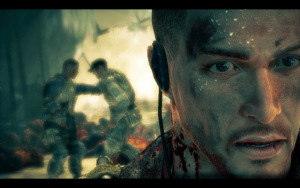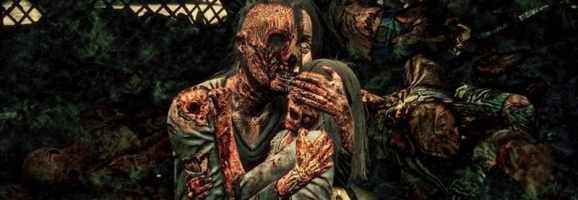White Phosphorus in Spec Ops: The Line and the Transition of FPS Shooters

As the technology of war advances, so too must the weapons in popular first-person-shooter video games such as Call of Duty and Battlefield. The usage of white phosphorus (known as Willy Pete in Vietnam) in the conflicts during the latter half of the 20th century and the early 21st century has caused many a controversy with human rights and just war theory. Due to its chemical properties, white phosphorus can absorb more phosphoric acid (the acid that causes burns after exposure to the chemical). The way white phosphorus irritates and damages tissues has lead to it being banned from use against civilians, but this law has been overlooked in the past few years, particularly in the Gaza War of 2008-2009. White phosphorus’ inclusion in the video game Spec Ops: The Line represents the change of gamer taste in today’s culture; as a society we have gone from being able to experience one dramatic moment and remain pleased to constantly needing an assault of action to risk losing our attention to something more exciting.
Spec Ops: The Line is a first-person shooter that stands out from the rest of the franchises we as a society are consistently bombarded with advertisements for; the complete lack of jingoistic motives behind the protagonists and killing of foreigners break down the game to a basic search-and-rescue concept taken from Joseph Conrad’s Heart of Darkness. With such a simple idea behind the plot, Spec Ops: The Line could have easily failed and faded into obscurity. Instead, it manages to make the player question their real motives behind playing video games in the shooter genre.
The first time the player is introduced to white phosphorus is on the receiving end; this immediately signifies a change in how war games affect the player. Typically, a player is given a new technology and is allowed to use it to their heart’s content regardless of the consequences. Here, the players sees the NPCs roll around in the sand trying to extinguish the chemical burns as their skin is slowly charred; however, the player is forced to endure more firefights amidst the bodies, removing the attention from the gruesome deaths and placing it back on the game’s objective. The emotional whiplash between the horror of chemical burns and the fast paced action ultimately leaves the player with a shock and awe combination that can be summed up by the casual gamer in one sentence: “Whoa, that was cool!” The player is given a taste of a new technology and then has it revoked as quickly as it is dangled in front of them. If Spec Ops: The Line was any other first-person-shooter, this moment might be the one moment people remember that distinguishes it from the rest of the genre; thankfully, Spec Ops is not as superficial as the cover may allude.
A few levels after the first appearance of Willy Pete, the player is forced to use white phosphorus against the 33rd battalion in order to progress. Through the radar camera used to survey the immediate area, the game presents the player with a large white grouping of people. The player, assuming this to be a large crowd of rogue soldiers, fires without discrimination (partly due to the fact that any hostile shows up on the camera in white). It is then revealed that the large group of white was actually a refuge for forty-seven civilians. By firing the mortar at the refuge, the player character (and effectively the player) is responsible for all forty-seven of their deaths. This kind of twist fills the player with a genuine sense of dread as they realize the atrocity they have committed. The player messed up and the game shows the bodies of the men, women, and children murdered through this senseless act of violence. While the deaths may have been virtual and have no affect on the real world, this kind of reaction is unexpected from the player. They could have been prepared for an overwhelming disgust or pleasure from all of the gore or a cathartic wash of the senses as they try to unwind from a stressful day but true regret in an action that they have performed is something that shooters have stayed away from.

Toward the end the player is hit with a white phosphorus mortar and the player character begins to hallucinate a desert of fire for a few moments. Instead of walking through the aftermath and seeing what happens to others, the player directly experiences the effects of the chemical bomb. While the fire is all brought on from a hallucination and isn’t actually occurring, the player sees a visual manifestation of Captain Walker’s guilt from killing the forty-seven civilians. Not only does the player feel bad, but the main character shares in their regret, acting as a refreshing break from the machismo main characters of Call of Duty games who show no remorse in killing entire armies of people.
The over-exaggerated use of action and twists in modern video games is a direct reflection of controversy based sales. After Call of Duty: Modern Warfare every video game franchise (including Call of Duty) has attempted to outdo the games before it. Spec Ops: The Line subverts this and provides the gamer with two very well done twists that comment on the state of shooters in the video game culture; the players are forced to question why they are drawn to this genre as a whole if the entire plot of the games are based off of these incredible acts of violence. Perhaps a quote by the player character is predicting the future of twists in shooter video games: “Maybe the loss is worth the gain”. If we lose the subtlety found in older games and are more in favor of always being entertained to the point of saturation, maybe we’ll eventually find a better way to tell a story without needing to resort to the glorification of violence to this extent.
What do you think? Leave a comment.











That phosphorus mortaring is the only time I have felt disgusted with myself when playing a game, and I love Walt Williams for making me feel that. This is a real step forward in storytelling for this maturing industry.
Yeah this part of the game irked me. I attempted repeatedly to gun down all those soldiers and did a great job as I knew what was coming when I saw the people in the IR. Regardless, try as i might the infinite deadeye snipers ate all my ammo then killed me.
There is actually a part later in the game where I thought they’re gonna do the same thing. There is a mob of civilians throwing rocks. Fortunately you have he options here, if of course you stop and think.
SPEC OPS The Line – was the only game that I can recall that made me sit back and really think about after I completed it. I was shacken with the decisions Walker had to make and blindsided by the story’s end. I served in the United States Army for 10 years and with training and my experiences I could ‘kill’ the ‘human’ enemy when needed. Yet, Civilians and non-combants were to always be protected and actions taken to minimize casualties if it came to an ‘us versus them (enemy)’ engagement where my soldiers would be killed was the rule.
The game addressed many aspects that modern military leaders have had to contend with in Iraq and Afghanistan. Decisions must be made when under fire with limited information at the time… that later when the fighting is done… you find out the horrible truth… that many service personel have had to deal with. The game gives many of the players a very small piece of the ‘unknown’ and ultimately damaged caused to soldiers when a decision was the right one with what you knew then turns out to have caused great suffering to innocent people or been a terrible mistake that you now have to live with.
That said, who would have ever thought that the 12 to 20 something generation that has been desensitized by FPS’s actually had to take responsibility for their actions (on an extremely limited scale) and see the consequences of their actions. Real Combat or Violence is not a video game… and there is no way to go back to fix what happened.
I think, more broadly, it touches on the problem how such technologies further dehumanize war.
Dehumanize war? Isn’t that oxymoronic?
Great read. Well written and interesting! I hadn’t thought about it before.
I believe the scene was just set up to demonstrate the difficult choices that have to be made in the heat of war. There is indeed a choice. It is simply a very unfair one. You’ll need to use the white phosphorous to get past the encampment. You are not a one man army. If you would have gone toe to toe with the encampment you would have died. Thus the choice was forced on you, to use the White Phosphorus.
Spec Ops doesn’t let you progress without making this choice is just compounding this fact. You can draw the attention of the encampment but you will eventually die.
This was a scene that was crafted to set the stage for the main characters post traumatic stress condition. He did see the victims of war, and what his necessary choice had caused. Which also caused a massive ripple in the morale of the group overall. Personally, I thought the whole thing was a very well put together scene.
I realise my comment might sound like spin, but that’s how I feel about it.
Essentially, it is about the horrors of real warfare; how even when you do have a choice of what to do in the middle of a war-zone, it is not going to be as easy as right and wrong, good and evil. There is always going to be a consequence, even though you did the only thing you could have done to survive.
I should pick this game up sometime, it seems to be much more different than the other, more “mainstream” games. I believe Willy Pete was also used in Call of Duty Black Ops, but its effects did not have the emphasis shown in this game apparently. Very interesting topic, and article.
Do you feel like a hero yet?
*Spoilers* I enjoyed the aspects of the game where your comrades reacted to you like you were crazy and you didn’t know why. Like when there are two or three people hanging from the rafters you can choose to kill one to ease his suffering, but when you do they look at you like you did something strange. It is only later that you find that the men were already dead and that you shot a dead body. It was a great game to see the psychological break of a man.
This part hit me hard and I knew it was coming.
I got to the end of the game and I was just sitting there feeling burned out and wondering just why I played FPS games in the first place.
Great story; Conrad would’ve been proud at the way this game makes us view other cultures, and the White Phosphorus scene was a beautiful capturing of that “horror” inside of us. Just wanted to note, as a technical thing, that the game is actually a Third-Person shooter, similar to Gears of War, but I completely agree all the same that its subject matter resembles far darker tones than many other games of its kind.
I picked up Spec Ops believing it to be just another Call Of Duty or Brothers in Arms remake, perhaps a branching off of the Gears of War motif of little story-telling in exchange for fast-paced, loose action and extreme violence. In fact, I would not have even played the game had I not been immensely bored and looking for a seemingly quick and cliche game providing a nice Gamerscore boost. This game starts in the same manner as the aforementioned franchises, but soon evolves into a powerful and gripping story revolving around the ideas of choice and duty. It examines how far one would go if they truly believed they were doing what was demanded of them. The white phosphorous scene is one of the very few in gaming that left me honestly unable to move after watching. Forcing the character to use the chemical weapons against a seemingly insurmountable army, with only clustered blips on a radar screen indicating that there were human lives behind those dots. Then, in the corner, a mass amount of blips, and you’re thinking how much of a service you’re doing ridding the world of these villains; all this only to realize that the horror of chemical weapons has turned these rescue soldiers into Death itself. The emotional impact and the raw visuals are unlike anything I have seen in gaming, and provide not only a powerful lesson on the horrors of chemical weapons, but forces the player to question why they play war-based shooters in the first place.
Possible Spoilers: Spec Ops was simply incredible. There were so many details to the game that really pushed it towards a masterpiece of story-telling. One aspect that caught me off guard was Martin Walker’s vocals. As the game progresses you can hear his voice catching and breaking, swearing at his opponents with a tone of despair and insanity rather than the usual gun-ho cries of the protagonist.
The white phosphorus section where you have to walk through the destruction you’ve created was a haunting moment that I still on occasion think about.
And the hallucinogenic part where he sees his fallen compatriot as one of the heavy enemies trying to blast a hole through him had me pause the game to reconsider what I was actually playing.
I honestly would love to see more games put this much thought into your consequences and actions and ask the question ‘are you mad for playing this’?
The post is really nice..but the game itself isnt a FPS,you play on 3rd person,but yes,a pretty good game to play and think about when the campaign its done.Shame it is so underrated and unknown.
Spec Ops was one of my favorite gaming experiences because of the White Phosphorus scenario. It really does hammer the player about the grotesque nature of war and the crimes they’ve committed. It really resonated with me.
I watched several videos of the white phosphorus scene long before playing the game, but it didn’t do anything to numb or dampen the event when it finally happened. I also liked the small touch that you can see Walker’s reflection in the screen when you’re bombing the soldiers and civilians. The juxtaposition of his battered human face against the faceless white outlines that could scarcely be said to be human was outstanding, imo.